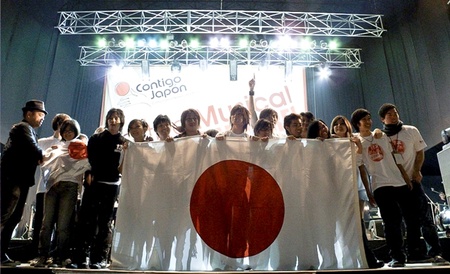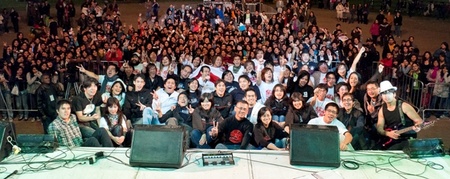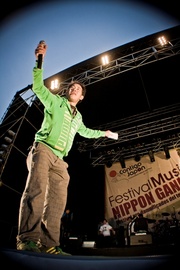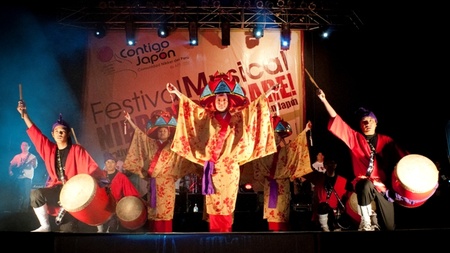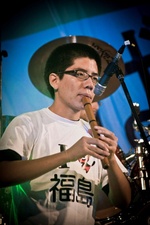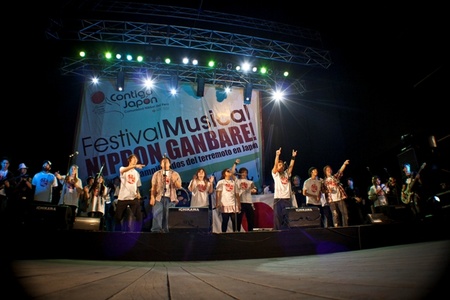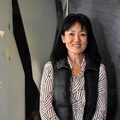Aunque de las sombras se asome la adversidad
sé que tu luz propia brillará
Pese al dolor que canta con desilusión
volarás una vez más
Volverás a nacer, vuelve a brillar otra vez
Quiero verte sonreír, siempre estaremos junto a ti
Canción Nippon Ganbare
La música tiene esa magia especial que convoca y une, como quedó demostrado en el Festival Nippon Ganbare, que se realizó el 21 de mayo en el Estadio La Unión, Lima, con el objetivo de recaudar fondos a favor de los damnificados del terremoto y tsunami ocurridos en Japón en marzo pasado, como parte de la Campaña Contigo Japón emprendida por la comunidad nikkei del Perú.
El festival permitió congregar a más de dos mil personas, logrando recaudar S/. 50,000 (aproximadamente US$ 18,000) y, sobre todo, consiguiendo que muchísimos jóvenes trabajen en equipo, con un mismo objetivo y sentimiento que supieron contagiar a todos. La solidaridad, las ganas de ayudar y el kimochi se dejaron sentir entre todas las personas que asistieron al festival.
Un sueño hecho realidad
El festival fue así el corolario de varias semanas de esfuerzos, coordinaciones y sueños hechos realidad. La idea nació de un grupo de jóvenes del Movimiento de Menores de la AELU, que plantearon la realización del festival, iniciativa que fue respaldada por la Asociación Peruano Japonesa (APJ) y por la AELU, que coorganizó la actividad.
Richard Yagui, director de Juventudes de la APJ fue el responsable general del festival y un equipo de más de cien jóvenes liderados por Erica Olivera Kanna, coordinadora general del evento, se encargaron desde la producción artística hasta coordinar temas como los auspicios, seguridad, difusión, logística, finanzas, entre otros.
Todos presentes
simismo, se convocó a bandas musicales y agrupaciones artísticas de jóvenes nikkei, que no dudaron en decir “Presentes” y participar en el festival. Fueron cerca de 140 jóvenes representando a Akari, Akasia, Akinee, Hayabiki, K-chiashi, Mochigomez, Okinawa Chanpuru, Ryukyu koku Matsuri Daiko, Perú Nakagusuku Seinenbu, Sei Dansu y Perú Kitanakagusuku Sonjinkai.
Además de la participación de cada agrupación sobre el escenario de la AELU, todos se unieron al final para interpretar la canción Nippon Ganbare, compuesta de manera colectiva por los artistas nikkei.
También se contó con la participación de Gonzalo Torres, Daniel Marquina y Gachi Rivero, de Radio Planeta, Akinori Sato y Carlos Alcántara, todos artistas peruanos que apoyaron en la conducción del festival y en la difusión previa del evento. Cabe destacar que el actor Carlos Alcántara donó además S/. 1,000. Emocionado, señaló que no olvidará los momentos que vivió en Japón, durante el terremoto, y que no podía dejar de colaborar con esta buena causa.
Además de estos artistas, colaboraron grabando videos de invitación los actores Melania Urbina, Diego Bertie, Gianella Neira, Christian Meier, así como los conductores de TV Bruno Pinasco y Adolfo Aguilar.
Saludos desde el Japón
Los organizadores del festival también lograron que la Sony Music Japan enviara videos con saludos y agradecimiento de dos grandes artistas japoneses: la banda Flow y el compositor, actor y vocalista Takanori Nishikawa, de las bandas TM REVOLUTION y ABINGDON BOYS SCHOOL.
“Nos hemos enterado que en Perú están organizando un evento para apoyar al Japón y nos están brindando mucho valor con sus palabras y sus actos. Les pedimos que nos sigan brindando sus fuerzas para poder caminar juntos. ¡No nos rendiremos!”, señalaron los integrantes de Flow.
Por su parte, Nishikawa, quien es además líder de STAND UP JAPAN, campaña de solidaridad por el terremoto en Japón, expresó también su agradecimiento a todos los peruanos y su deseo de venir al Perú. “En verdad, muchísimas gracias por este evento que están haciendo por Japón. Nos estamos esforzando para que Japón vuelva a estar lleno de energías”, indicó.
El Festival Musical Nippon Ganbare fue así un esfuerzo conjunto, un objetivo compartido y un solo deseo de expresar la solidaridad con el pueblo del Japón. ¡Misión cumplida!
* Este artículo se publica gracias al convenio entre la Asociación Peruano Japonesa (APJ) y el Proyecto Discover Nikkei. Artículo publicado originalmente en la revista Kaikan Nº 57, junio de 2011 y adaptado para Discover Nikkei.
© 2011 Asociación Peruano Japonesa



